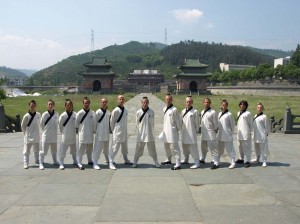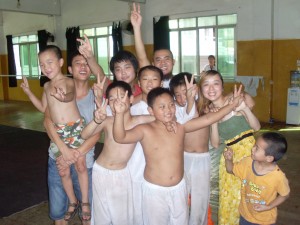 We had a lecture on discipline this week from Master, which dovetails nicely with my own recent reflections. While I was in Hunan teaching that summer program for kids, the effort of trying to get them to rise to an acceptable discipline level had me thinking about how discipline is taught. I think it is a great mystery to me still, but I am starting to get a few ideas.
We had a lecture on discipline this week from Master, which dovetails nicely with my own recent reflections. While I was in Hunan teaching that summer program for kids, the effort of trying to get them to rise to an acceptable discipline level had me thinking about how discipline is taught. I think it is a great mystery to me still, but I am starting to get a few ideas.
There are, of course, two kinds of discipline: external discipline and internal discipline. External discipline is when someone else is yelling at you and punishing you when fail to meet expectations. China in general, and our kungfu school in particular, is a great place for external discipline. When one steps out of line, there are shouts, lectures, and ultimately a cane to put one back on course.
Internal discipline is the real prize, however. It is self-discipline, self-control that lets one do what one needs to do when no one is there to motivate you. This is what a human being needs to live well, and this is what we train kungfu to find. It is the superior kind of discipline; a self-disciplined individual thrives even in an external-discipline environment, but an externally disciplined individual withers without their discipliners.
I have come to believe that we in the West misunderstand the role that external discipline plays in developing internal discipline. It is logical that if one is always externally disciplined, one never develops the responsibility to be self-disciplined. This is certainly true. But I think this leads people to try to teach self-discipline with a kind of sink-or-swim approach. We throw ourselves, our students, and our children into deep water, trusting to instinct or chance to teach them the right self-reliance. If they sink, we drag them out, but just chuck them back in the deep water at the next opportunity. Without incredible luck, failure cycles downward into more failure, and discipline is lost altogether.
I feel that external discipline is like the shallow end of the pool. It’s true you will never truly learn to swim if you never leave the shallows, but there are valuable lessons to be learned there: comfort in the water being foremost, but also coordination. In terms of discipline, comfort in the water is just confidence and an understanding of the benefits of discipline.
Coordination means fidelity between the part of your mind giving commands and the part carrying them out. This is critical. When I first came to Wudang, getting up at 5:00 AM was a huge challenge. I would tell myself to get up, but the part of me receiving the command didn’t believe it would happen, and this lack of faith made self-discipline impossible. I didn’t believe I would do what I told myself to do. So I would be late for training. Punishment pushups and the humiliation of being punished are not fun at 5:15AM, and after a while I learned to get up on time if only to avoid them. But in that process, my lower mind began to believe that it would do what my upper mind told it, and this was an important step for me.
So I have come to believe that teaching self-discipline needs external discipline. Opportunities for self-reliance must be given, but the time in between must be used to practice the coordination that makes success possible.

